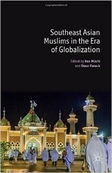Southeast Asian Muslims in the Era of Globalization

Islam and Muslims in Southeast Asia have been described using two sets of contradictory terms. On the one hand, they are imagined as being Sufistic, syncretistic and localized, and thought to be different from their counterparts in the Middle East. On the other hand, the danger of radical Islam has been emphasized and Southeast Asia suddenly became a risk in the context of the global war on terrorism. The latter viewpoint has become particularly prevalent after October 2002 Bali bombing in Indonesia.
This volume seeks to bridge the gap between these opposing perceptions by analyzing the Muslim responses to globalization and process of negotiation in Southeast Asia. The authors identify the position of Islam and its role in society by analyzing how industrialization, capitalism, democratization, secularization, and other Western models of modernization have been re-contextualized in each state, region, and territory. Globalization adapts to local conditions and penetrates deep inside terrorists. The authors attempt to suggest global solutions for key local issues that have emerged as a result of the conflict between globalization and Islam. This volume also offers an empirical analysis of how religion and globalization intersect each other and influence people’s attitude to governments and to Islamism, based on an opinion poll conducted by the JICA-RI in four Southeast Asian countries.
This book is the outcome of the research project entitled Islam and Development in Southeast Asia conducted by JICA-RI from 2008 to 2011.
scroll